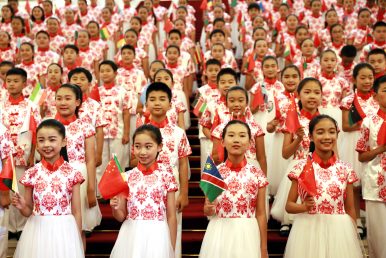By Zhang Chao
 Xi Jinping’s announcement offering $60 billion(about 400 billion Chinese renminbi) in financial support to Africa at the triennial Forum on China-Africa Cooperation, with 40 African presidents in attendance, was met with loud applause at the Great Hall of the People. However, Xi’s decision got a different reception among the Chinese people. A heated debate on the necessity of Chinese development assistance has been unfolding online. One of the arguments by critics that is garnering wide sympathy is that China is still a developing country, where millions of Chinese people are living below the poverty line. Their logic is that Chinese money should be spent at home to help Chinese people in need, while assistance to the others can wait.
Xi Jinping’s announcement offering $60 billion(about 400 billion Chinese renminbi) in financial support to Africa at the triennial Forum on China-Africa Cooperation, with 40 African presidents in attendance, was met with loud applause at the Great Hall of the People. However, Xi’s decision got a different reception among the Chinese people. A heated debate on the necessity of Chinese development assistance has been unfolding online. One of the arguments by critics that is garnering wide sympathy is that China is still a developing country, where millions of Chinese people are living below the poverty line. Their logic is that Chinese money should be spent at home to help Chinese people in need, while assistance to the others can wait.
This discrepancy indeed rankles for many. Although China has become the second largest economy in the world and an inspiring example of poverty alleviation, there were still over 30 million Chinese, mostly residing in central and western rural China, fighting for food every day by the end of 2017. Xi has vowed to pull them all out of poverty by 2020, and geared up the Chinese bureaucratic machinery to meet his ambition. In this context, it is easy to make a sharp comparison between the astronomical 400 billion RMB pledged to foreigners and the miserable lives of 30 million Chinese, causing people to wonder if it would be a better idea to spend this money on their compatriots.
Moreover, the Chinese economy has been going through a difficult time in recent years, which can be felt by people in their daily lives. The new evidence of this growing difficulty is the slow-down in Chinese retail sales growth, which recently reached the lowest level in the past 15 years with a record of only 8.5 percent growth in May 2018. This triggered grave concern over the so-called “consumption downgrade.” When people have to calculate the spending of every Chinese yuan meticulously, it is no surprise that they would be filled with anger upon hearing that their government has decided to give out billions abroad.
Although it is the target of the anger, the Chinese authority itself should be blamed for this public hostility as well. China has rapidly grown to be a cardinal donor, but it is extremely shy about talking about its assistance abroad. As of now, Beijing has only released two white papers on its assistance activities, in 2011 and 2014 respectively. When it is willing to speak, China has attempted to underplay the egoistic nature of development assistance (how it benefits China) while underlining its altruistic face (how it benefits the recipient). This might help China win some appreciation from the developing world, but when this narrative is applied domestically, it will never be effective. As a result, China’s development assistance has been plagued by myths. Chinese taxpayers have no option but turn to all sorts of information sources — some of them quite misleading — for answers.
One example is a recent post on the Chinese internet. In the post, the author compares the Chinese $60 billion commitment to Africa with the GDPs of Tibet and Qinghai provinces as well as China’s investment in fields such as education, health, containing pollution, and alleviating poverty. Certainly, this is completely misleading, as the author does not mention the fact that only one-quarter of the Chinese financial package can be classified as development assistance, and the grants to Africa could occupy an even smaller proportion. But the post won popularity, and shows how easily the public can be misled due to the scarcity of information and the absence of an authoritative voice.
In sum, the hostility of the Chinese public toward development assistance mirrors their displeasure over the reality of the situation. This certainly can only be fixed in the long term. In the short term, however, China might consider giving up the effort to look its development assistance program look good in front of its home audience, and make relevant information more transparent and easily accessible. Otherwise, Chinese policymakers will have to bear still more pressure from public opinion in the future.
Zhang Chao is an Assistant Researcher at the Institute of European Studies, Chinese Academy of Social Sciences.
No comments:
Post a Comment